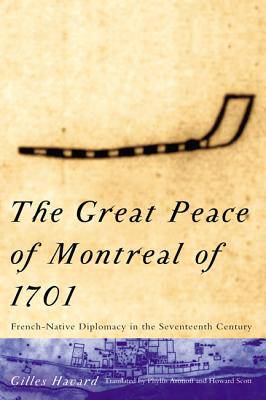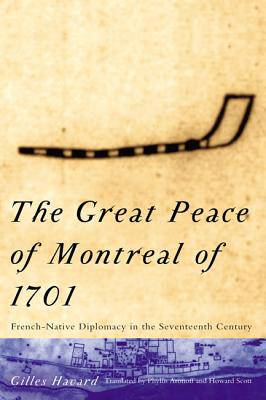
Je cadeautjes zeker op tijd in huis hebben voor de feestdagen? Kom langs in onze winkels en vind het perfecte geschenk!
- Afhalen na 1 uur in een winkel met voorraad
- Gratis thuislevering in België vanaf € 30
- Ruim aanbod met 7 miljoen producten
Je cadeautjes zeker op tijd in huis hebben voor de feestdagen? Kom langs in onze winkels en vind het perfecte geschenk!
- Afhalen na 1 uur in een winkel met voorraad
- Gratis thuislevering in België vanaf € 30
- Ruim aanbod met 7 miljoen producten
Zoeken
The Great Peace of Montreal of 1701
French-Native Diplomacy in the Seventeenth Century
Gilles Havard
Hardcover | Engels
€ 177,45
+ 354 punten
Omschrijving
The last decades of the seventeenth century were marked by persistent, bloody conflicts between the French and their Native allies on the one side and the Iroquois confederacy on the other. In the summer of 1701, 1,300 representatives of forty First Nations from the Maritimes to the Great Lakes and from James Bay to southern Illinois met with the French at Montreal. Elaborate, month-long ceremonies culminated in the signing of The Great Peace of Montreal, which effectively put an end to the Iroquois wars. In The Great Peace of Montreal of 1701 Gilles Havard brings to life the European and Native players who brought about this major feat of international diplomacy. He highlights the differing interests and strategies of the numerous First Nations involved while giving a dramatic account of the colourful conference. The treaty, Havard argues, was the culmination of the French colonial strategy of Native alliances and adaptation to Native political customs. It illustrates the extent of cultural interchange between the French and their Native allies and the crucial role the latter played in French conflicts with the Iroquois and the British. As we approach the 300th anniversary of the treaty's signing in August 1701, Gilles Havard emphasizes its contemporary significance: in signing a treaty with forty separate parties the French recognized the independent sovereignty of every First Nation. This translation is significantly revised and updated from the original French publication of 1992.
Specificaties
Betrokkenen
- Auteur(s):
- Uitgeverij:
Inhoud
- Aantal bladzijden:
- 320
- Taal:
- Engels
Eigenschappen
- Productcode (EAN):
- 9780773522091
- Verschijningsdatum:
- 25/05/2001
- Uitvoering:
- Hardcover
- Formaat:
- Genaaid
- Afmetingen:
- 158 mm x 235 mm
- Gewicht:
- 589 g

Alleen bij Standaard Boekhandel
+ 354 punten op je klantenkaart van Standaard Boekhandel
Beoordelingen
We publiceren alleen reviews die voldoen aan de voorwaarden voor reviews. Bekijk onze voorwaarden voor reviews.









